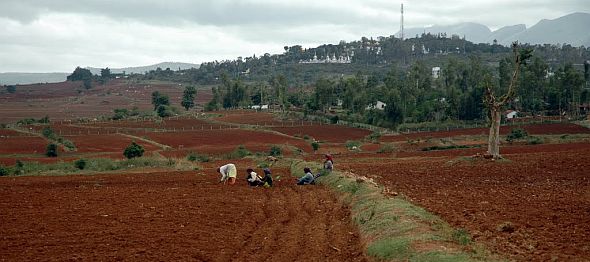
(TibetanReview.net, Nov13, 2016) – The five Tibetan settlements in the south Indian state of Karnataka have lost standing crop worth Rs 37,713,424.89 (US$ 5,58,247.69) due to severe drought, said the exile Tibetan administration at Dharamshala, India, Nov 11. The severity of the drought was unprecedented in the history of these settlements and affected 5,900 acres of standing crops, the report said.
The near-total loss of crops was reported to have brought hundreds of Tibetans families in the settlements at Bylakuppe, Hunsur, Kollegal and Mundgod to the brink of an urgent economic crisis.
“We are faced with the most severe case of crop failure ever recorded in Tibetan exile history. All the five major Tibetan settlements have been gripped by an unfortunate and severe drought this season,” Mr Chemi Rigzin, Acting Secretary at the exile administration’s Department of Home has said.
The biggest loss, at worth Rs 30,032,233.57, was suffered by the Tibetans in Kollegal which had the largest agricultural community among the settlements. In Mundgod (at worth Rs 3,003,126) and Hunsur (at worth 2,280,245.72) the losses were reported to have ranged between 50 and 80 percent of standing crops. And in Bylakuppe, with its two settlements, the loss was put at worth Rs. 2,397,819.60.
Chemi Rigzin has said as much efforts as possible would be made to compensate the Tibetan families for the loss of their crops, especially those who had incurred losses of 50 per cent or more of their crops.
Mr Tsering Dorjee, Joint Secretary of the exile administration’s Home department was reported to have led a detailed survey to assess the loss in Kollegal, Bylakuppe and Hunsur Tibetan settlements while a local official did the same in the Mundgod Tibetan settlement.
With just one acre or so of land per individual, Tibetans in the settlements have great difficulty sustaining themselves even in the best of times and many of them supplement their income by selling winter wears in seasonal markets they set up in towns and cities across India, taking loans from banks.


